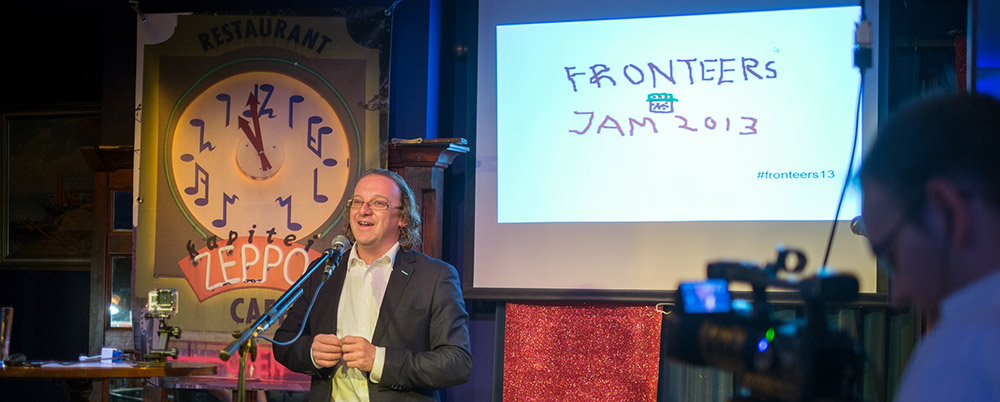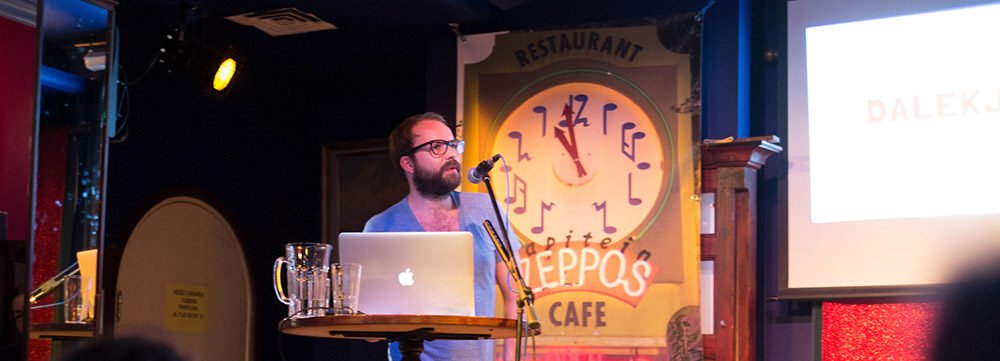Fronteers 2013 Jam Session
Years and years ago, not anymore invited for the speakers dinner, Anne van Kesteren and Koen Willems were really pissed off. So, since they were already in Amsterdam the night before the conference and had nothing else to do, they hired a bar, organised a handful short talks, gave a big party and forwarded the beer bill to Fronteers.
Since that was the birth of a tradition, we announced the
Fronteers Jam Session, 2013 Edition
This year it took place on Wednesday October 9, 21:00 to 01:00.
We hired the bar (Kapitein Zeppos, Gebed Zonder End 5, 1012 HS Amsterdam), brought in a beamer, a screen and some mics and Fronteers paid the bill.
You did the rest.
We had quite a few talks during the evening.
Like last year all talks were recorded and will be published online afterwards.
There were approximately 200 attendees visiting the Fronteers Jam Session.
Therefore we hired the bars upstairs and downstairs.
But still and again, it was overcrowded, noisy, hot and steamy. We had a good time!
See also this page at Lanyrd
The 2013 Jams
Keynote by Brenno de Winter

This year the keynote speaker for our Jam Session was Brenno de Winter.
Brenno is a journalist specialized in IT security and privacy. An advocate of a transparent government, he was proclaimed “Dutch journalist of the Year” in 2011. A straightforward champion for freedom of speech and freedom of information, he is not only a pain in the backside for governments but also a warm and inspiring man.
We were proud to welcome him to our Jam Session!
Blowing off steam by Wes Oudshoorn
As a designer working with (front-end) developers in a technology filled world, my frustration rises to unprecedented levels. In this short session, he shared between 2 and 20 frustrations.
Science: it works, bitches by Arjan Eising
A comparison between the workflow and habits of a scientist and a front-end developer. What can we learn from each other?
Sketching Sketches with Sketch – Vectors for the web by Andreas Dantz
It doesn't always have to be an expensive tool from Adobe. Especially if you're working for the web exclusively.
Test-driven CSS by Jakob Løkke Madsen
A short introduction on how to apply test-driven development methodologies to CSS and HTML using http://jakobloekke.github.io/tdcss.js/
Don’t look into the source by Roman Komarov
At the 2012 Jam Session Roman showed and tried to explain how to animate pseudo-elements.
This time he showed five demos of things you thought are not possible in CSS, but he didn't tell you how he did them. Instead, he tried to motivate you not to look into the sources of all the cool demos you happen to see in the internets, to skip the explanations and step-to-step tutorials in favour of your own exploration and experimentation.
DalekJS - Shifting to the frontlines of UI testing by Sebastian Golasch

Testing webpages is the inglorious bastard of our time. After we tamed this beast called 'Unit testing' it is now time to shift our frontlines to another topic. This times its all about your UI. And no, we did not going to penetrate our old enemy Selenium, no we were not fighting in the ruby-ish fields of Watir, no my friends, this time it was JavaScripts move to exterminate your bugs once and for all.
Metaprogramming by Mathias Bynens
A short talk about writing programs that generate source code for other programs, a technique advocated by X-Zibit, Christopher Nolan, et al.
The future of the web by Eric Eggert
Where is the web heading? What will we as frontend developers do in a few years? Will Google, Apple or the NSA win?
Talking HEADs by Jan van Hellemond
Front-end web development is about HTML, CSS and JavaScript, right? Wrong! It's about HTML, CSS and JavaScript and HTTP. You might think that the protocol that has been serving us and our pages since the early nineties is showing its age, but I still has some surprises in store for us developers. This talk was about the path from browser to server and back, and the distractions and attractions along the way.
The Perception of Speed by Steve Souders

When does slow actually feel fast? And vice versa? Steve provided examples from the Web and the real world that show it's not all about metrics - sometimes altering the user's perception of speed is the best path to a better user experience.
Javascript is evil by Wilfred Nas
Javascript has become the most popular language of the world. Unfortunately, we rely on it too much and forget that we write for an open and accessible web. Building single page apps without a proper fall back isn't helping our users.
Semantic JavaScript: Beyond Frameworks, Beyond DOM by Max Shirshin
After years of web technologies evolving, we finally have the power to move beyond individual frameworks. Tools become less relevant, and methodologies prevail. Bridge JavaScript with other web techs and operate on unified terms regardless of tools you use.
Nowadays, methodologies like BEM or Web Components bring semantics back and make it a first-class citizen, while underlying DOM-based structures are just the "byte code" for the browser to operate on.
Max discussed ways to uplift your code from framework level to methodology level, with some nice examples.
divide @ impera : Developing not web pages but interface components by Varya Stepanova
In 2012 she presented BEM as a way to modularize the development of pages. By breaking things into Blocks, being able to break those into Elements, and then use Modifiers on them, we get a neat TLA and a methodology where each part can advance rapidly and independently, instead of having to get the CSS done, and then have everyone wait for the Javascript guy, only to have the project return to the HTML guy and have to run through the whole development cycle again.
This time Varya was showing what a great difference BEM makes to the process of development. Building independent interface components, rather than separating the HTML, CSS and Javascript development, we get unified terms (the frontend dialect) for all the project guys, reusable code and scalable teams
Developing developers by Paul Verbeek
One of our bigger problems at the moment is finding good developers.
But instead of finding the best of the best, we should find the motivated and make them the best.
How can you be a great coach, and help new developers trancend even your own skills?
Source — Front-end documentation engine by Robert Haritonov
How to manage front-end development process within team of developers and designers effectively? Odnoklassniki.ru, world ‘Top 10’ social network, will share their experience in solving this question using open Source front-end documentation engine.
Source was created to help front-end developers, designers, programmers and testers to become more productive and create best interfaces for the product.
Their solution suits well for the big development teams, growing web projects, outsourced projects maintained by freelancers and web studios to optimize development time.
Attendees
- Aakash Bapna
- Aleksandr Motsjonov
- Alexander Kersten
- Alin Predoi
- Andreas Dantz
- Anneke Sinnema
- Anne van Kesteren
- Annouk Pilet
- Anthony Ringoet
- Anton Kouliavtsev
- Arjan Eising
- Arjen Kaldenbach
- Babs Gösgens
- Berit Hlubek
- Bert Wijnants
- Bramus van Damme
- Branko Kolesarić
- Bran van der Meer
- Burkhard Pauli
- Carolina Roldán Garrido
- Charis Rooda
- Christian Angermann
- Christian Jul Jensen
- Christian Schaefer
- Christian Vosen
- Christoph Burchartz
- Christopher Hlubek
- Cormac Flynn
- Daniel Lübbers
- Darius Kruythoff
- Dennis Gieseler
- Dennis Kernkamp
- Dennis van Homoet
- Dieter Roobrouck
- Dijana Ceric
- Dirk Pennings
- Dylan Schoenmakers
- Dominik Hanke
- Edwin Dekker
- Edwin Martin
- Elmer Bulthuis
- Elwin Schmitz
- Eric Eggert
- Eric Peeters
- Evert Albers
- Fabian Beiner
- Fabian Tempel
- Felix Nyffenegger
- Filidor Wiese
- Florian Fischer
- Francisc Romano
- Franziska Gertz
- Frederic Hemberger
- Gela Sidortsova
- Glenn Glerum
- Gregory van Looy
- Henk Jan Bouwmeester
- Hetty de Vries
- Hidde de Vries
- Ian Devlin
- Indrek Vändrik
- Jacob Søndergaard
- Jaco Koster
- Jaime Vega
- Jakob Løkke Madsen
- Jan-Erik Revsbech
- Janita Top
- Jankees van Woezik
- Jan van Hellemond
- Jeroen Ooms
- Jeroen Visser
- Joeri Deplus
- Johannes Busch
- Johan Ronsse
- Johan Smits
- Johan Sterenberg
- Johannes Busch
- Jonathan Krause
- Joris Hens
- Juan Pablo Pincheira
- Jules Ernst
- Kaj Rietberg
- Kamil Kuliczkowski
- Ken Depelchin
- Kenneth Auchenberg
- Kenny Brijs
- Kevin DeRudder
- Koen Haarbosch
- Koen Kivits
- Koen Willems
- Krijn Hoetmer
- Kristin Rohleder
- Kristoffel Houben
- Lennart Schoors
- Lien van den Steen
- Lisette Mazure
- Liv Madsen
- Maik Wagner
- Mallory van Achterberg
- Marc Hinse
- Marco Egli
- Martijn Croonen
- Martijn van Duuren
- Martina Freundorfer
- Martin Bichsel
- Martin Hintzmann
- Martin Savelkoul
- Martin Schneider
- Mate Nadasdi
- Mathias Bynens
- Matijs Brinkhuis
- Matthias Slovig
- Max Shirshin
- Michael Hastrich
- Michaela Kaulmann
- Mircea Piturca
- Mirella van Teulingen
- Mirkka Niiranen
- Moritz Stoltenburg
- Nikolaj Schouboe
- Niels van Midden
- Nils Riedemann
- Oliver Zeyen
- Onno van der Tholen
- Pascal Szewczyk
- Paul van Buuren
- Paul Verbeek
- Pavlo Bogomolenko
- Pepijn Olivier
- Peter Beverloo
- Peter Foerger
- Peter Müller
- Peter van Grieken
- Petra Schanz
- Rebecca Mackay
- Renate Kikkert
- Rense Verhoeve
- Reinier Ladan
- Rian Rietveld
- Richard van der Pol
- Rob Azevedo
- Robbert Broersma
- Robert Haritonov
- Robert Jan Verkade
- Robin van Loon
- Rob van der Burgt
- Rodney Rehm
- Roel Nieskens
- Roel van Gils
- Roman Komarov
- Romke Bon
- Ruben Janssen
- Sander Aarts
- Sander van Lambalgen
- Sandra Kallmeyer
- Sanne Peters
- Sara Devuyst
- Sebastian Golasch
- Sebastian Hilbig
- Sergey Berezhnoy
- Sophie de Brabander
- Stefan Hellings
- Stephen Fischer
- Steve Haigh
- Steve Souders
- Steven Benisek
- Stijn Janssen
- Sven Wolfermann
- Tanel Lebedev
- Thijs Reijgersberg
- Thomas van Zuijlen
- Timo Uhlmann
- Tobias Tom
- Tom Claus
- Toon Ketels
- Tristan Turpin
- Trygve Lie
- Vadim Makeev
- Vadim Patsev
- Varya Stepanova
- Vasilis van Gemert
- Verena Ruf
- Vic Rau
- Victor Bastiaansen
- Viktor Kelemen
- Vitaly Friedman
- Vitaly Harisov
- Vladimir Grinenko
- Vladimir Kuznetsov
- Wes Oudshoorn
- Wilfred Nas
- Wim Hendrikx
- Wim van Iersel
- Yelena Jetpyspayeva
- Yolijn van der Kolk
Details
- When: Wednesday October 9th, 21:00-01:00
- Venue: Kapitein Zeppos
- Address: Gebed Zonder End 5, 1012 HS Amsterdam
(Photos from last year by Andreas Dantz)
